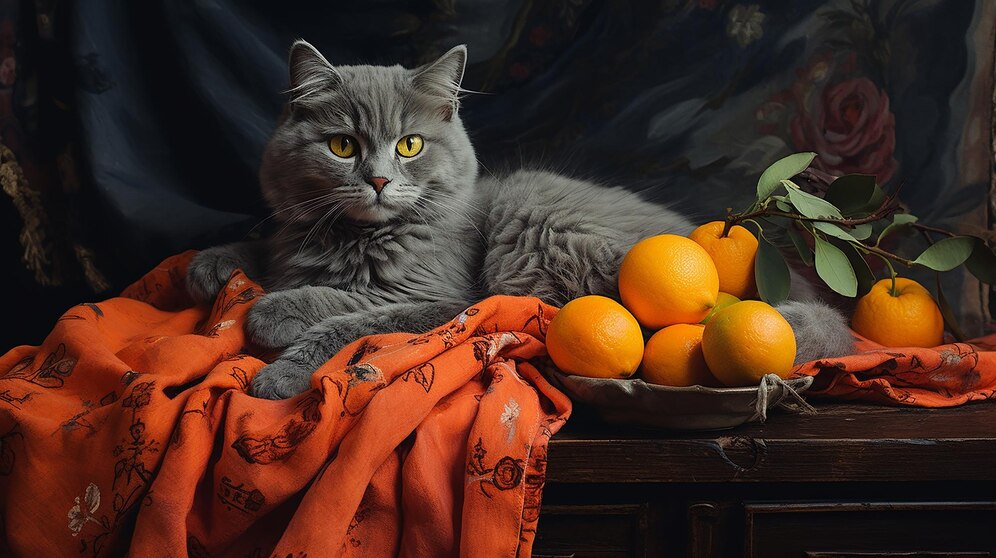If you’re a cat parent, you might often wonder about what foods are safe for your cat. With a plethora of information available, it can be confusing to determine which fruits are beneficial and which ones pose risks.
One fruit that often raises eyebrows is the bright and juicy orange. It’s refreshing taste and high vitamin C content make it a staple in many human diets, but does this citrus fruit have a place in your cat’s bowl?
Imagine the peace of mind you’ll have knowing exactly what treats are safe for your beloved companion. After all, your cat deserves the best nutrition, just like any member of the family. By uncovering the facts about oranges and their suitability for cats, you can make informed choices that benefit your pet.
Read on to discover whether cats can eat oranges, the potential health benefits or risks involved, and how to safely incorporate fruits into your cat’s diet if appropriate!
Can Cats Eat Oranges?
Cats are carnivores, meaning their diet primarily consists of meat. Fruits like oranges are generally safe for humans, they can pose risks for cats. Oranges contain citric acid, which can lead to gastrointestinal upset in cats, resulting in symptoms like vomiting or diarrhea. The sugar content in oranges may not be suitable for your feline friend, especially if they have underlying health issues like diabetes.
Small amounts of orange flesh may not cause immediate harm, it’s best to avoid feeding your cat oranges altogether. If you’re looking to introduce fruits into your cat’s diet, consider safer options like blueberries or small pieces of cooked pumpkin.
Why Are Oranges Harmful to Cats?
Oranges can be harmful to cats for several reasons. Firstly, the citric acid in oranges can irritate a cat’s stomach, leading to digestive issues such as vomiting and diarrhea. The essential oils and compounds found in the peel and seeds can be toxic if ingested in significant quantities. Cats lack the enzyme necessary to metabolize these compounds effectively, increasing the risk of toxicity. Read Kidney Disease in Cats: Early Signs You Shouldn’t Ignore
The high sugar content in oranges can be detrimental, especially for cats with pre-existing health conditions. If your cat has diabetes or is prone to obesity, the sugar found in oranges can exacerbate these issues, leading to serious health concerns. Read Why Does My Cat Follow Me Everywhere?
Signs Your Cat Has Eaten an Orange
If your cat has eaten an orange, there are several signs to watch for that may indicate they are experiencing an adverse reaction. Common symptoms include:
· Vomiting
· Diarrhea
· Lethargy
· Loss of appetite
· Abdominal discomfort
· Excessive thirst
· Hiding or seeking isolation
· Excessive grooming
· Tense abdomen
Read Also
Why Does My Cat Follow Me To The Bathroom
What About Orange Juice or Peel?
Orange juice and the peel can also be problematic for cats. Orange juice, even if it’s freshly squeezed, contains high levels of sugar and citric acid, which can upset your cat’s stomach. Read Can Cats Eat Onions? A Deadly Threat
Many commercial juices have added sugars and preservatives that can further complicate matters. As for the peel, it contains essential oils and compounds that are toxic to cats. Ingesting the peel can lead to gastrointestinal distress or more severe health issues. Read Can Cats Eat Bananas?
How Do I Stop My Cat from Eating Oranges?
Start by keeping oranges and any orange-flavored products out of reach. This includes storing them in cabinets or on high shelves where your cat cannot access them. If your cat is particularly curious, consider using deterrents like citrus-scented sprays, which many cats dislike, to discourage them from exploring areas where oranges are kept.
What About Orange-Based Cleaning Products?
Orange-based cleaning products, often marketed as natural or eco-friendly alternatives, can be appealing due to their pleasant scent and perceived safety. It’s essential to understand that these products may still contain ingredients that are harmful to cats. The natural oils extracted from oranges can be irritating to a cat’s digestive system, skin, and respiratory tract.
When using orange-based cleaners, ensure that your cat is kept away from areas where these products are applied. The strong citrus scent may attract your feline friend, but ingestion or contact with the skin can lead to adverse reactions, including vomiting, diarrhea, and other gastrointestinal issues. Don’t give chocolate to your cat
Always check the labels of cleaning products for any harmful ingredients, and select for pet-safe alternatives whenever possible. If you notice your cat has been exposed to any cleaning products, contact your veterinarian immediately for advice and care.
Safe Fruits for Cats
- Bananas
- Watermelon
- Strawberries
- Blueberries
- Raspberries
- Cranberries
- Blackberries
- Apples
- Mangos
- Pineapple
- Cantaloupe
- Apricots
- Cucumber
- Honeydew
- Kiwi
- Nectarines
- Pears
Dangerous Fruits for Cats
- Grapes
- Raisins
- Lemons
- Limes
Read More



